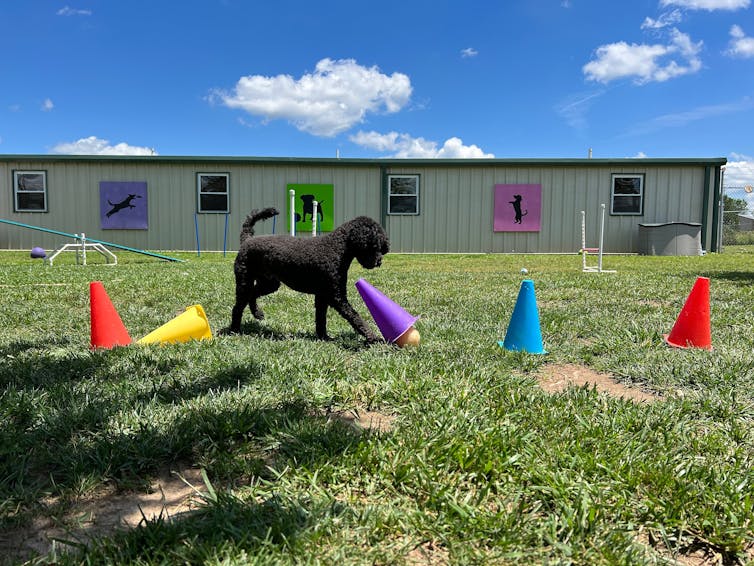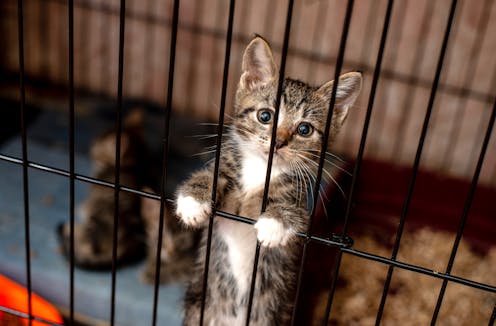Source: The Conversation (Au and NZ) – By Melissa Starling, Postdoctoral Researcher in Veterinary Science, University of Sydney
Around this time of year, pet owners across the country are scrambling to finalise holiday care arrangements.
Some lucky animals go to the home of a familiar family member, pet-sitter or friend. Others may have a pet sitter mind them in their own home. But another common solution is to put your dog or cat in a boarding facility while you’re away.
Boarding facilities can be small and boutique, or very large; some house hundreds of animals at once over the December-January period.
Here are five things to think about before boarding your dog or cat over the holidays.

Photo by Elina Volkova/Pexels
1. Boarding can be stressful
Boarding facilities during peak periods can be stressful environments for dogs and cats.
Common stressors include:
High density pet housing can also increase the risk of illness.
2. Some animals are not suited to boarding
Some animals come into a boarding facility and adjust within a few days, appearing to be their usual happy selves. Others may adjust more gradually.
But some animals only become more distressed the longer they are boarded.
They may display repetitive behaviours or bark and meow constantly.
In extreme cases, animals may:
- not eat at all
- be too aggressive for staff to handle safely
- lick or chew body parts
- injure themselves
- try to escape.
Although boarding facilities are built to keep animals in, it’s amazing what a desperate or panicking animal can get over, under, or through.
One study estimated 4% of cats are not suited to boarding because their stress levels did not decline over a two-week stay.
Think very carefully before booking commercial boarding for an animal that:
- is prone to anxiety
- dislikes loud noises or changes in their home environment
- will lunge, snap, scratch or bite if they get overwhelmed or startled
- has a history of trying to escape when panicked.
3. Boarding facility design matters
Facility design can have a big impact on how noisy or stressful it is, and how easily disease spreads.
Those with narrow passages or many kennels facing into a central walkway can provoke defensive or frustration-related behaviours in dogs, such as barking and lunging.
Large buildings packed with animals expose your pet to noise and activity, making it hard for them to relax and sleep.
It also increases the risk of spread of airborne pathogens such as Canine Infectious Respiratory Disease Complex (also known as kennel cough).
The facility may have larger common areas for exercise. These can vary enormously in design, from open spaces to yards containing play equipment and gardens.

Ryan Brix/Shutterstock
Well designed common areas introduce more environmental complexity. That means multiple levels, different surfaces, and places where scent can collect (such as under bushes).
One study found cats appreciated environmental complexity such as shelves and scratch posts, and cats with a slightly larger enclosure were less stressed than cats with a smaller one.
The same study found that the more cats they share a space with, the more stressed a cat will get. Those that haven’t been socialised with other cats should be housed on their own.
Try to view the facility before booking. The quieter it is, the better. Think about what size space your pet will be living in, and what spatial restrictions they have experienced and coped with before.
Are there options to pay for more yard time or walks? Choose walks or one-on-one time with staff over extra yard time if there is an option, as companion animals may be missing social contact with humans during their stay and appreciate a change in scenery from their enclosure and the yard.
Are all fences, gates, kennels and other equipment clean and safe? Animals are experts at finding sharp corners, tiny gaps, and broken infrastructure to injure themselves on.
4. Preparation is key
Try to ease your animal into a boarding experience gently by:
- doing short, try-out stays at quiet times so their first stay isn’t a complete shock
- ensuring your pet is up-to-date with vaccinations
- considering if animals already on anti-anxiety medication or at high risk for anxiety may need a higher dose for their stay. Talk to your prescribing vet, as this will need to be trialled before boarding
- ensuring your animal has experience being alone, preferably in unfamiliar places
- avoiding sending familiar items from home unless the facility encourages it; it’s a nice idea but most items will get soiled
- avoiding group housing with unfamiliar animals unless you have a social butterfly that actively tries to make new friends at every opportunity.
Social housing is an important way to ease the stress of kennelling on dogs in shelters long-term. However, it can be stressful for pets that don’t usually spend a lot of time around unfamiliar animals of the same species.
5. Think about how you’ll bring your pet home
Your animal may be unusually quiet after a stay in a boarding facility. They likely didn’t sleep as much as usual.
They may be extra keen to do stuff they couldn’t while boarding, such as exploring outdoor areas unrestrained, rolling in the grass, running, and spending time with their human family. Make extra time for these activities.

zhukovvvlad/Shutterstock
Monitor your pet for signs of illness. The most common illnesses animals pick up while boarding are cat flu and canine cough. It can be extremely difficult to control these contagious diseases in high volume boarding facilities, and being more stressed makes animals more prone to illness in general. Take your pet to the vet if they show any symptoms of being unwell.
![]()
Melissa Starling works for Pet Behaviour Vet, a company that offers veterinary consulting for behaviour problems in companion animals. She operates Creature Teacher, an animal behaviour consulting business.
Melissa Starling previously worked for a high-volume pet-boarding company.
– ref. 5 things to know before boarding your dog or cat this summer – https://theconversation.com/5-things-to-know-before-boarding-your-dog-or-cat-this-summer-244479





